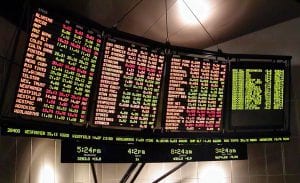
US Stock Market Crash History: Learn to Earn
April 24, 2024
Throughout history, the US stock market has experienced numerous crashes, each offering valuable lessons for investors. As legendary investor John Bogle warned, the relentless pursuit of quick profits fueled by greed can lead to greater market instability. The 2008 financial crisis, triggered by the collapse of overvalued subprime mortgages, exemplifies this concept. Niccolò Machiavelli, the renowned strategist, might interpret market crashes as a manifestation of the human struggle for power and control, where influential players manipulate information for personal gain, as seen in the 1980s insider trading scandal.
Stoic philosopher, Seneca’s teachings on the impermanence of fortune, align with the cyclical nature of financial markets. He would advise investors to view market downturns as natural occurrences rather than unforeseen disasters. The 1929 and 2000 market crashes demonstrate this principle, reminding us to maintain stability in both prosperity and decline. Charlie Munger, Warren Buffett’s business partner, emphasizes the importance of acknowledging the limits of our knowledge and the irrationality of markets. His concept of ‘Lollapalooza effects’ – the confluence of multiple biases and psychological tendencies – contributes to market excesses and subsequent crashes, as seen in the Dot-Com Bubble driven by unfounded optimism in tech stocks.
Bubbles, Busts, and Reforms: Lessons from Market Crashes
The Dot-Com Bubble of the late 1990s exemplifies a speculative bubble driven by the allure of the internet sector. Investors, chasing rapid gains, funnelled capital into internet companies, leading to excessive stock valuations. The bubble’s collapse exposed the fragility of many Internet businesses, revealing unsustainable business models and a lack of profitability. The swift change in market sentiment triggered a widespread sell-off, causing the stock market to crash.
The 1929 stock market crash, known as Black Tuesday, marked the onset of the Great Depression. Factors contributing to the crash included rampant speculation, stock overvaluation, and insufficient regulatory oversight. The aftermath of the crash brought about significant financial reforms, including the creation of the Securities and Exchange Commission to regulate the securities industry.
In 2020, the COVID-19 pandemic triggered a unique stock market crash driven by an external health crisis that led to widespread economic shutdowns. The rapid spread of the virus and ensuing lockdowns disrupted global supply chains and business operations, creating a climate of uncertainty that roiled financial markets. The COVID-19 crash reminds us of the market’s vulnerability to sudden external shocks and underscores the importance of risk management and diversification in investment strategies.
The 2008 Housing Market Crash, driven by a mix of aggressive lending, a housing bubble, and complex financial derivatives, had a widespread economic impact. The crash underscored the dangers of speculative excess and the need for more stringent financial oversight, reshaping regulatory frameworks and influencing future monetary policies.
Fear, Greed, and Strategy: Mastering Market Crashes
Mass psychology suggests that stock market crashes represent monumental opportunities for investors. As Warren Buffett famously stated, “Be fearful when others are greedy, and greedy when others are fearful.” During market crashes, fear and panic often lead to irrational selling, driving stock prices below their intrinsic value. Savvy investors can capitalize on these opportunities by purchasing undervalued stocks with strong fundamentals, positioning themselves for significant gains when the market recovers. Examples include investors who bought stocks during the 2008 financial crisis and the COVID-19 crash, benefiting from the subsequent market rallies.
Combining mass psychology with technical analysis can fine-tune investment strategies during market crashes. Technical analysis involves studying historical price and volume data to identify trends and patterns that can signal buying or selling opportunities. By understanding market sentiment through indicators like the VIX (Volatility Index) and the Put/Call Ratio, investors can gauge fear and greed levels in the market. When these indicators suggest extreme fear, it often coincides with market bottoms, presenting attractive entry points for long-term investors. Conversely, indicators of excessive greed may signal an impending market correction, prompting investors to take profits or hedge their positions.
Conclusion
In conclusion, the history of US stock market crashes offers invaluable insights for investors. Investors can navigate turbulent times and seize opportunities by understanding the underlying human behaviours and market dynamics contributing to crashes. Combining the wisdom of investing legends, the teachings of philosophers, and the power of mass psychology and technical analysis, investors can develop robust strategies to weather market storms and emerge stronger. As the saying goes, “History doesn’t repeat itself, but it often rhymes.” By learning from the past and embracing the cyclical nature of markets, investors can position themselves to learn and earn through the ups and downs of the US stock market.
Lost in Reflection: Stimulating Perspectives
Smart Money Or Dumb Investors Chasing Yields
Wall Street Journal States that Russia Bombed US-Syrian Base
Japan’s Economy: Abe Mulling Another Round of Stimulus
Zero Percent Mortgages Debut: Setting the Stage for Next Bull Market
Brexit’s Currency Wars: Hidden Theme for Financial Freedom
Surviving the Bear Stock Market: What’s New for Investors?
Fed Interest Rate: Negative Rates Are A Game Changer
What Economic Recovery? Most Americans Lack $1000 In Savings
Federal Reserve Interest Rate: Dangers & Benefits of Negative Rates

Why Are Interest Rates So Low: Coronavirus That’s Why
CAT Stock Price Projections And Future Trends
Why own gold in uncertain times: Protection From Disaster
HD stock quote And future price trends
Valeant Shares Slump

End Of Bull Market: Masses Worry Higher Rates Will Kill This Bull
Stock Market Crash History: Learn from the Past or Be Doomed


